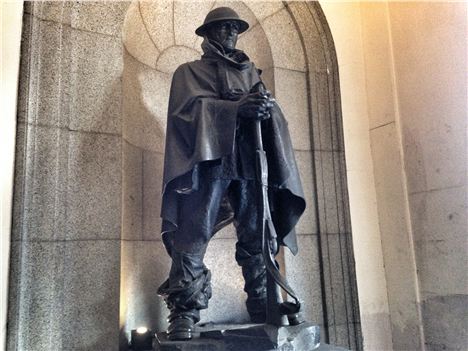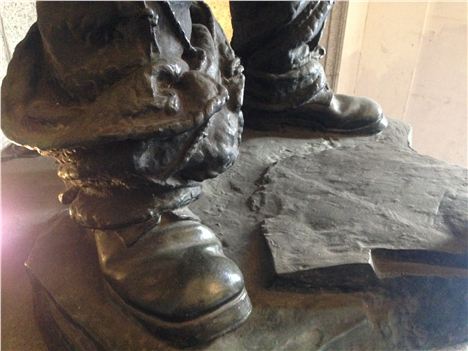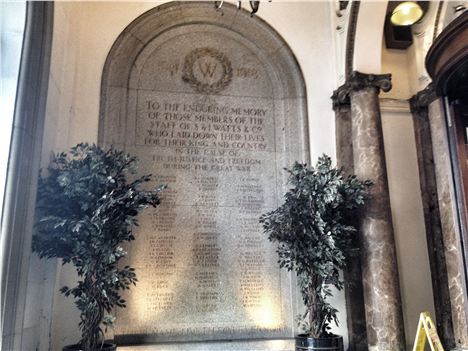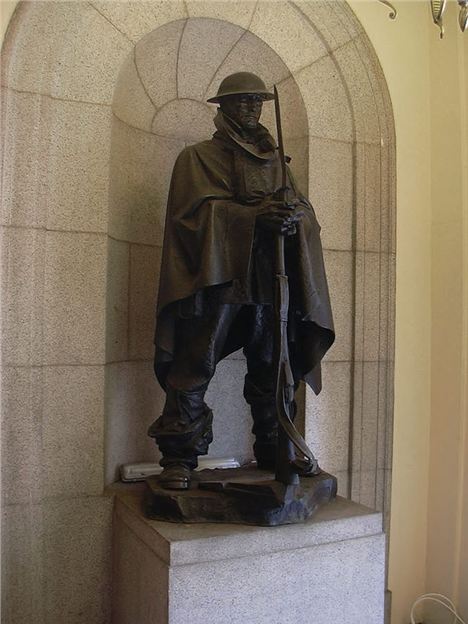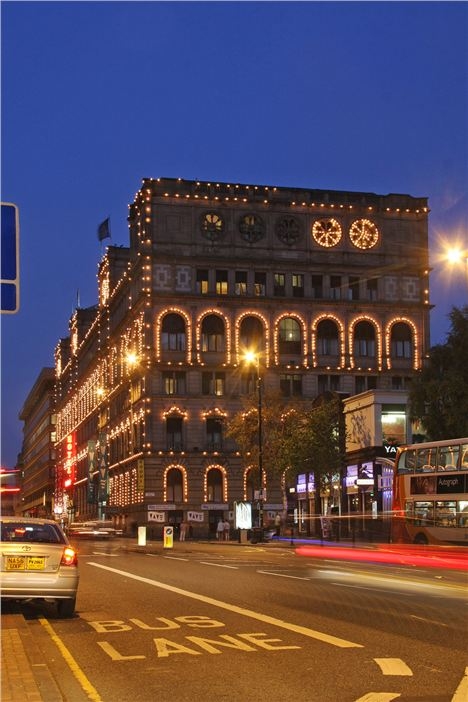THERE's only one place I go in central Manchester to brood on World War One. I go to the tired and faded Britannia Hotel and look a determined Tommy in the eye.
In the lofty foyer of this former textile warehouse is Charles Jagger’s unforgettable Manchester Sentry.
None of the other city war memorials have work that approaches Jagger's in its power, feeling and accomplishment
Our warrior is defiant and watchful but weary too, exuding from all his metallic pores and all the metallic folds and lines of his great coat, ‘the pity of War’, as poet Wilfred Owen, an officer in the Manchester Regiment described it.
There is no better work in the city to individualise the conflict and put a face to the ghastly statistics of death as the European powers threw their men onto the guns and the wire. British and Commonwealth forces lost just shy of a million dead with over two million wounded.
The Manchester Sentry
Wilfred Owen was perhaps the best known of the war poets. He died just before Armistice Day in 1918. His mother opened the telegram informing the family of his death as church bells were ringing to announce the end of the war. You can see Wilfred Owen’s name in the Books of Remembrance in the Regimental Chapel in Manchester Cathedral.
Owen's words about the 'pity of War' refer to his desire to reveal through his poetry the tragedy of war, its reality, the blood and mud rather than vague notions of glory and honour, abstract nouns far removed from the actual slaughter.
The sculptor of the Manchester Sentry likewise wanted to keep it real. Charles Sargeant Jagger, originally from Rotherham, had served in the war and had been wounded. He knew the war from the inside.
Detail of the boots, with sagging, mud-heavy, puttees
He wanted his sculptures to be the opposite of derring-do idealism and show something of the grit of the fighting man and life in the trenches. His species of 'realism' was at odds with the mood of the day, when all the most progressive artists were adopting the various schools of Modernism. At the same time Jagger's realism was far removed from the melodrama and sentimentality of much art before 1914.
The Manchester Sentry was commissioned by the Watts family for their textile heaquarters in Manchester to mark the sacrifice of several hundred of their staff.
The names of those killed from the Watts company are listed opposite the Manchester Sentry
The statue was erected in 1921. After surviving the 1940 blitz that destroyed so many buildings around the Piccadilly area, it was vandalised sometime in the noughties when the bayonet mounted on the rifle was stolen. No doubt it was a drunken prank in a hotel that promotes cheap drinks, but it damaged the balance of the artwork.
The Manchester Sentry with his bayonet - now stolen
The Britannia Hotel group is the same group sitting on the London Road Fire Station site opposite Piccadilly Station. It has reneged on agreement after agreement to ensure the mouldering building is given new life.
We have to be thankful, back in the 1980s after the Portland Street building had closed as a warehouse, that the Britannia group rescued it through conversion to a hotel. Thirty years on the goodwill is exhausted. Given the hotel group's lack of respect for the city it's perhaps too much to expect them to respect Jagger's Manchester Sentry and replace his bayonet.
The Britannia and its erratic illuminations
There are a number of company war memorials in Manchester buildings including a large one at Victoria Station. This features the devil, in otherwords German militarism, being slain by St Michael, in otherwords the democratic countries, but none of the other city war memorials have work that approaches Jagger's in its power, feeling and accomplishment.
My great-uncle Tom Hodgson was a member of the regular army at the start of the war. He embarked in August 1914 with 80,000 others for Belgium and France. He didn't last the month, killed at the Battle of Mons. I think of him, now a century dead, when I pause by Jagger's Manchester Sentry. I try to give a nod to all the war dead.
More...
World War One is not just fascinating for personal reasons. The static nature of the war in western Europe, to-ing and fro-ing over a few miles of terrain, with heavily industrialised nations, blasting millions of tons of hot metal over man, beast and landscape, is gripping, hellish.
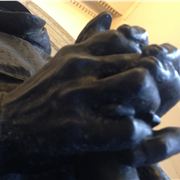 DetailIt is the ultimate metaphor for the 'pity of war', the horrors, discomfort and hardship.
DetailIt is the ultimate metaphor for the 'pity of war', the horrors, discomfort and hardship.
Wilfred Owen's friend Siegfried Sassoon, another poet, in his Memoirs of an Infantry Office, captured the scale and pity of the war in his description of a battalion returning to a camp behind the lines after being at the front in the Battle of the Somme in 1916. It's magical prose.
‘An hour before dawn the road was still an empty picture of moonlight. The distant gunfire had crashed and rumbled all night, muffled and terrific with immense flashes, like waves of some tumult of water rolling along the horizon.
'Now there came an interval of silence in which I heard a horse neigh, shrill and scared and lonely. Then the procession of the returning troops began. The campfires were burning low when the grinding jolting column lumbered back. The field guns came first, with nodding men sitting stiffly on weary horses, followed by wagons and limbers and field kitchens. After this rumble of wheels came the infantry, shambling, limping, straggling and out of step. If anyone spoke it was only a muttered word, and the mounted offices rode as if asleep. The men had carried their emergency water in petrol cans against which bayonets made a hollow clink; except for the shuffling feet this was the only sound.
'Thus, with almost spectral appearance, the lurching brown figures flitted past with slung rifles and heads bent forward under basin helmets. Moonlight and dawn began to mingle, and I could see the barley swaying indolently against the sky. A train groaned along the riverside sending up a cloud of whitish fiery smoke against the gloom of the trees
‘Soon (the troops) had dispersed and settled down on the hillside, and were asleep in the daylight which made everything seem ordinary. None the less I had seen something that night which overawed me. It was all in the day’s work – an exhausted division returning from the Somme offensive – but for me it was as though I had watched an army of ghosts. It was as though I had seen the war as it might be envisioned by the mind of some epic poet a hundred year’s sense.’
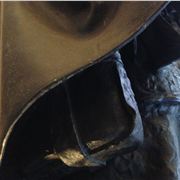 DetailThe hundred years are here and on the centenary of the outbreak of war we have in Manchester, Jagger’s glorious, evocation of that war. Of course, our Sentry now stands guard over stag parties and hen parties from the Britannia Hotel, while just through the doors an A-Board in reception advertises two for one deals and shooters for £1.
DetailThe hundred years are here and on the centenary of the outbreak of war we have in Manchester, Jagger’s glorious, evocation of that war. Of course, our Sentry now stands guard over stag parties and hen parties from the Britannia Hotel, while just through the doors an A-Board in reception advertises two for one deals and shooters for £1.
Let’s hope one day the Britannia Hotel restores the bayonet to our Tommy, makes him complete. And let’s not be too precious. Doubtless many of the hundreds of thousands of dead soldiers from the 1914-18 conflict would have appreciated a two for one deal if they’d made it back. Sometimes when I look at The Manchester Sentry I reckon he could do with a drink.
You can follow Jonathan Schofield on Twitter @JonathSchofield or connect via Google+








